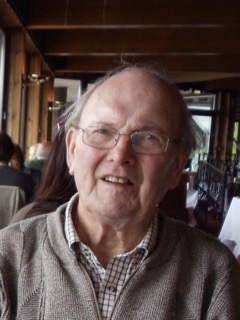September 2013
Being Heavenly-Minded

Ted achieved that status 25 years ago when my dad passed away in Scotland at the end of a wonderful anniversary trip. My brothers and I were thousands of miles away, but Ted was on site and came alongside my mother, helping to care for the necessary arrangements until I could get there just barely in time for the memorial service. Though we didn't see each other often, I will miss him, and his death has me thinking again about what is and what will be.
Such thinking, I have decided, is healthy in spite of the fact that it may be rare. My train of thought was pushed further along the track this morning when I came across a quote from C. S. Lewis (Mere Christianity) who observed that "the Christians who did most for the present world were just those who thought most of the next." It is an observation that flies in the face of contemporary wisdom. It is a difficult truth that I cannot fully know heaven until I get there; whatever it will be, it will be better than I can imagine. But even with an incomplete and imperfect knowledge, focusing on what will be makes me more effective in handling what is.
I don't much like funerals, but they have an undeniable value for me whether I actually attend them or not. They confront me with the need to think about what will be and not just about what is. Lewis went on to say, "It is since Christians have largely ceased to think of the other world that they have become so ineffective in this. Aim at heaven and you will get earth thrown in; aim at earth and you will get neither.
He was right. Lord, keep me aimed at heaven.
Comments
Change
03 09 13 10:03 Filed in: Reflections
In an imperfect world, one of the few constants is change. There was a time when I welcomed change more readily than I do now. I suppose age has something to do with that. Like most people I can easily become comfortable with the status quo; I'm uncertain about giving up the certainty of what is for the uncertainty of what might be. The older I get, the more I value the immutability of the Almighty. So I can understand the discomfort of my 95 year old mother-in-law when the facility that has been her home for over a year decided to move her to a new room.
 It was a needed move. Her new room is on a floor that has staff around the clock, and she will be safer and better cared for there. But knowing that doesn't make the change any more comfortable. When we heard of the move last Wednesday, we headed north, committed to do what we could to minimize the impact, but expecting that she would be irritated. We were not disappointed. As it turns out, even at her advanced age, she is adjustable. We were able to resolve a couple of the most pressing irritations, and by the next day, reunited with her favorite pillow and with the promise of her cable being reconnected, she was more upset with us for spending gas money to get there than she was with the change of her room. I wondered if I would have done so well.
It was a needed move. Her new room is on a floor that has staff around the clock, and she will be safer and better cared for there. But knowing that doesn't make the change any more comfortable. When we heard of the move last Wednesday, we headed north, committed to do what we could to minimize the impact, but expecting that she would be irritated. We were not disappointed. As it turns out, even at her advanced age, she is adjustable. We were able to resolve a couple of the most pressing irritations, and by the next day, reunited with her favorite pillow and with the promise of her cable being reconnected, she was more upset with us for spending gas money to get there than she was with the change of her room. I wondered if I would have done so well.
She has been navigating change for 95 years. Though it may seem that she deserves a break, the reality is that as long as God continues to give her days, she will be challenged by change. It's likely that more changes are just around the corner for her.
And for us, too. In the normal course of events, we will one day hear that she has moved to her heavenly home from which there will be no more moves. For her it will be a most welcome change; she has repeatedly told us she is ready for the Lord to take her. For us, left in an imperfect world, it will be one more change to navigate, and one more reminder to anchor ourselves to the One who doesn't change -- and doesn't need to.

She has been navigating change for 95 years. Though it may seem that she deserves a break, the reality is that as long as God continues to give her days, she will be challenged by change. It's likely that more changes are just around the corner for her.
And for us, too. In the normal course of events, we will one day hear that she has moved to her heavenly home from which there will be no more moves. For her it will be a most welcome change; she has repeatedly told us she is ready for the Lord to take her. For us, left in an imperfect world, it will be one more change to navigate, and one more reminder to anchor ourselves to the One who doesn't change -- and doesn't need to.